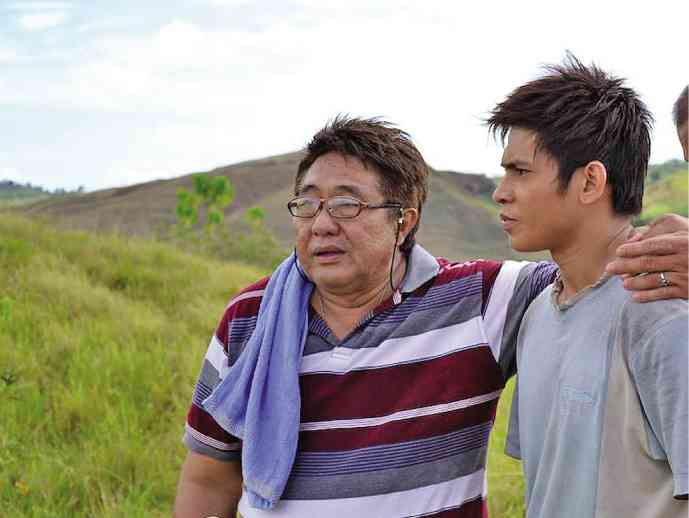Direk Maryo pays tribute to his Bohol roots
Direk Maryo J. de los Reyes and I fondly call each other “Tokyo Love” because we immensely enjoyed our bonding in Japan with my mom and the family in early 1990, when she was still alive. That unforgettable trip turned us into kindred spirits.
Maryo J’s gentle soul is manifest in “Bamboo Flowers,” his entry to the Sineng Pambansa All-Masters Edition (Sept. 11-17 at all SM Cinemas). The movie will have a special red carpet premiere on Oct. 26 at Island City Mall in Tagbilaran, Bohol.
The film centers on young people deeply rooted in Bohol. Maryo J takes an honest look into the problems that beset people today, like bullying, urban migration, child labor, hopelessness and desperation. With writer Aloy Adlawan, Direk has created another masterpiece reminiscent of his internationally acclaimed film, “Magnifico.” He once again engages us with his seamless storytelling— poignantly funny at times but with a lot of heart in it. “Bamboo Flowers” will make hopeful aspirations bloom within you.
Here’s my tête-à-tête with Direk Maryo J.
How did “Bamboo Flowers” come about?
When I first met with Chair Briccio Santos [of the Film Development Council of the Philippines] about Sineng Pambansa, I was encouraged to shoot in my home province of Bohol. The problem of theme became a burden. I prayed for guidance about what I needed to say about Bohol and its people. Then I saw bamboo flowers on bamboo trees.
I usually stay for the final hymn [in Holy Mass] since the “Ite Missa Est” (the priest’s concluding words, “Go, the Mass is ended”) has been said and the celebrant has given his blessings. But on this one Sunday Mass, I joined in singing the final song, “Give Thanks.” When I started to sing [the words], “And now, when the weak say I am strong and the poor say I am rich! Because of what the Lord has done for us, give thanks!” the words revealed to me a special message of and for Bohol. They who feel weak have become strong and they who think they are poor are indeed rich. The Boholanos are rich—in natural resources, in heritage, in culture and customs, in beautiful sentiments. In their hearts are treasures of strength and valor, of generosity, faith and love. Tourists pay thousands of dollars to see the Chocolate Hills, the tarsiers, Loboc River and other scenic spots. They travel thousands of miles to get to Bohol’s diving spots and sunbathe on the powdery sands of its beaches. They all rush to buy a piece of Bohol, as evident in the rising cost of real estate.
Yet Boholanos do not realize these; most locals choose to leave. Students take up courses that give them the passports to work abroad and prefer to serve foreigners and strangers on distant shores. They leave Bohol to discover greener pastures. They do not realize the richness of their surroundings and the abundance of their own green pastures. They do not have faith in the value of their distinct characters and in their strength as a people.
Why must we watch your movie?
You should watch a Maryo J. de los Reyes movie whenever one comes out because it will always be remarkable. It talks about our lives, loves and hopes. There are a lot of characters in the movie that we can identify with. And because the movie has a big heart, it will remind us of our vulnerability as human beings.
Tell us more about “Bamboo Flowers.”
It is my contribution to the Sineng Pambansa—films for Filipinos made by Filipino master directors. That’s why we should patronize it.
“Bamboo Flowers” talks about the lives of the people of Bohol, about married life and single blessedness, young lovers and other strangers, students’ aspirations and ambitions, tourists who visit the province, sons and daughters of the farmers, tourist guides, cultural workers, children and ordinary people, and a mother returnee who rediscovers her roots and finds refuge from her convoluted and problematic past life in Manila. It will show the lives of young and the old Boholanos who have adapted to the changing behaviors of their lifestyles because of the dawning of tourism, technology and the demands of new age.
The title refers to the chandelier-shaped bamboo leaves/flowers that blossom on bamboo trees in the final stages of death. This paradox is evident in life on these islands, where traditions may be dying because times do change and because “progress” has “blossomed” and new things, outlooks, beliefs and practices have been introduced. Thus, there is the erosion of traditions and since there are new things to look forward to, there are beliefs and practices that have to be abandoned or left behind.
“Bamboo Flowers” is a tribute to my roots, particularly to my mother who hails from Alicia, Bohol; to the memories of my childhood visits to this island-province; to its rich heritage and traditions; to its lushness and beautiful landscapes; and, most specially, to its beautiful people.















